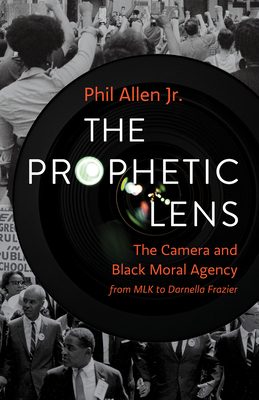Book Review: The Prophetic Lens: The Camera and Black Moral Agency from MLK to Darnella Frazier
Reviewed by:
Donna HillFrom the moment Africans were kidnapped, brought to America and enslaved, violence has been inflicted upon the Black body, mind, and spirit and continues to this day. In Allen’s book, he raises and answers several probing questions as to why white Americans throughout the history of this republic continue to engage in violence against Blacks. Central to his examination is how the camera lens has forced society to “see” the atrocities foisted upon Black bodies and summarily produce a shift in societal consciousness. The bigger question is: Will his thesis alter the “wall of hostility” (59) violence perpetuated by white against Black? Allen takes the reader on a photogenic journey of the Black struggle against invisibility and the right to be seen.
Perhaps one of the most stark and horrifying images was that of the mutilated body of Emmett Till, when his mother insisted there be an open casket for all the world to see what had been done to her son at the hands of white violators. We have all seen the historic “souvenir” postcard images of lynching parties, the scars on backs from the whipped, and we watched in disbelief the beating of Rodney King on video and told “not to believe our lying eyes.” In all these instances and countless more, the white perpetrators got off scot-free. Our pain, our suffering was not recognized—it was dismissed. We are invisible. Our pain, however, must be documented—accounted for.
There are satellites in the sky that can zero in on your street and with a bit of a Google search you can locate your home, in near to real time. There are cameras fixed atop streetlights, hidden in bushes, and mounted outside of homes. We are in a surveillance-driven society, fueled by smartphones and video monitoring. According to Allen, a PhD candidate in Christian Ethics at Fuller Theological Seminary who researches and writes on issues at the intersection of theology/ethics, race, and culture, this is an opportunity that must be seized.
“What if there was a Darnella Frazier with a smartphone who was a ‘fly on the wall’ capturing the events that so many dismiss as nonegregious or as actually not occurring at all? On social media there is no shortage of videos and articles of African American men and women who are profiled, mistreated, enduring excessive force, or unnecessarily—and often wrongfully—taken in handcuffs to jail. Black bodies have been under surveillance since slavery. The camera is the device that puts the means of surveillance in the hands of African Americans for their own protection and eyewitness account, and history confirms its necessity.” (30)
Throughout the text, Allen chronicles the seen and unseen struggle of Black Americans with insightful and detailed research that in the hands of another writer might read as heavy and maudlin. However, the serious though accessible tone of Allen’s writing makes it a work that is easily digestible.
He writes: “Darnella Frazier’s camera could not capture it [wall of hostility] in its dormant state, only in the state when it was aroused and its agents were undisciplined enough to be caught on video being what they are doing what they do. … the camera removes the veil each time it is used to document the experience of violence and injustice—blackness as liminality—that African Americans have been decrying for centuries. No matter how adaptable whiteness may be, it cannot escape the prophetic lens of the camera” (59).
The Prophetic Lens is a timely book. The author delves back and presents incidents of violence toward Blacks in earlier years and continues with the incidents of the present day. Does Allen’s work answer his “What if” question? Perhaps. What it does, however, is reinforce the power that Blacks and all marginalized and disenfranchised people have in their hands—the ability to capture the moment and to erase any doubt of their invisibility, compelling closed eyes to see.

